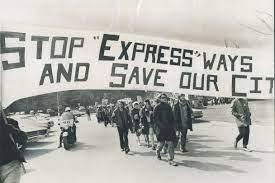
Designing a new democratic model for city planning decision making
https://www.demnext.org/projects/democratising-city-planning?utm_source=...
We are convening an International Task Force on Democratising City Planning as we believe that many urban areas in the world are facing a similarly dysfunctional systems for taking decisions on urban planning related problems that intersect with issues about climate, housing, homelessness, land use, infrastructure, etc.
From the conversations we’ve been having with stakeholders in different parts of the world, we sense that there is a consensus that the system is somewhat ‘stuck’, that many are unhappy with how it works today, that there are constant tensions between the different stakeholders involved in these decisions and, in particular, that citizens rarely play a meaningful part in the decision making process.
However, there is growing evidence of another possible way forward.
Comparative research from the OECD on deliberative Citizens’ Assemblies, where members are selected by civic lottery, highlights that 43% of the nearly 600 international examples of Citizens’ Assemblies addressed environmental, infrastructure, urban planning, and design decisions.
The evidence suggests that there really could be a better way to systemically take these types of decisions - a system that enables us to engage with the complexity and messiness of urban and city building challenges, to create better conditions for weighing trade-offs and finding common ground. In the context of the climate crisis and growing divisiveness, instigating systemic change is more urgent than ever.
Today it is common for a one-off participatory or consultation process to be initiated in relation to one development, but there are often hundreds of planning decisions ongoing at any one time. By taking this systemic lens, we acknowledge the complexity of the system, and consider where, and in which ways, citizen deliberation and participation could be leveraged to result in greater legitimacy, better decisions, and more democracy - in an ongoing way.
Urban design and planning decisions are also related to many different policy issues - from housing to mobility, transport, energy, climate change and many others. In this way, it is also a first step towards entirely rethinking systems of local government decision-making.
DemocracyNext believes that by creating new deliberative institutions, citizens can hold genuine power in planning, design, and infrastructure decisions and can play a critical role in the constellation of parties involved in urban design and planning processes.
What will be the output and the ultimate goal of this work?
The desired output of this International Task Force is a collaboratively produced model for an alternative system of urban design and planning decision making – one that has citizens, truly representative of the diversity of a community, at its heart, and in constructive relationship with the city government, planners, designers, developers, community groups, and nature. The ultimate aim of this Task Force is not just to publish a report, but for these ideas to lead to concrete action and change.
Who is part of the International Task Force?
The DemocracyNext International Task Force on Democratising City Planning is made up of around 15 globally renowned professionals from various spatial practices and the fields of deliberative and participatory democracy and collective intelligence to collaborate and reimagine how urban planning decision making processes could adapt and place more power in the hands of citizens. Our Task Force members are an international mix of planners, architects, landscape architects, academics, researchers, developers, public servants, innovators, policy-makers, and other experts from around the world to collaborate with DemocracyNext.
During this process, we will also engage a wider group of actors working in spatial practice, urban development, and deliberative democracy, to share the progression of this work. The intention is to collect wider feedback before finalising a proposal. This is essential to ensure that we create a model that is informed by as many perspectives as possible. If you, or someone you know would like to be part of this group, please reach out to James.
The output of this International Task Force will be a collaboratively-produced model for an alternative system of urban design and planning decision-making – one that has citizens, truly representative of the diversity of a community, at its heart, and in constructive relationship with the city government, planners, designers, developers, community groups, and nature.
How will the Task Force work?
Over a four-month period, we will convene the task force virtually and in person to develop this model together. Between the first two convenings in June and July 2023, DemocracyNext will attend the Urban Future conference in Stuttgart between 20-22 June, where we are leading a randomly selected, deliberative session on this theme. The initial ideas of the first convening will feed into some early propositions and key questions that will be shared and tested at the conference.
During the in-person convening in September 2023, the DemocracyNext team, along with the Task Force members will co-develop a set of propositions for a model of empowered and institutionalised citizen deliberation and participation for urban design and planning decisions.
In the autumn of 2023, we will launch the published model, translate it into in French and Spanish and disseminate it with a Call for Proposals for interested cities or regions to apply to work with us to provide support on contextualised implementation and evaluation.










Add new comment